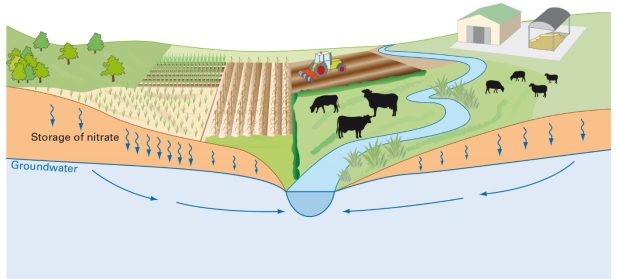Groundwater researchers at the British Geological Survey (BGS) have found a major store of pollution sitting in the rocks beneath our feet that they say could have severe global-scale consequences for our rivers, water supplies, human health and the economy.
In a paper published in Nature Communications, Matthew Ascott and fellow researchers from the British Geological Survey and Lancaster University have reported finding vast quantities of nitrate across the globe stored in rocks below ground and above the drinking water resources they hold as a result of human activity. Nitrate fertilizer helps feed the world but is also a major pollutant. When used in the wrong place it can cause serious damage to ecosystems and contaminate drinking water. As the stored nitrate is released from the rocks into rivers via springs, our precious ecosystems face the risk of a grim future of toxic algal blooms and fish deaths. Nitrate is also a concern for human health. It is the most widespread pollutant in drinking water sources (groundwater and surface water) with water treatment costing industry and consumers billions of pounds a year.

The authors of the paper have calculated the amount of nitrate present in rocks to be up to 180 million tonnes – up to twice the amount of nitrate stored in soils. They found the most nitrate to be stored in North America, China and Europe where huge quantities of fertilizer have been applied for decades. In some developed countries, they even found the amount of nitrate stored in the rocks to be increasing, despite improvements in farming practice and the introduction of regulations to control the pollutant. In developing countries, whilst the problem is currently not so severe, there is evidence of a worsening situation that requires early intervention to avoid the same problems and environmental damage experienced by highly developed countries.
Matthew Ascott, hydrogeologist at the BGS and lead author of the study, said:
“With big investments being made to reduce water pollution through changes in farming, it is vital that we understand what pollution is already in the environment. Water and the pollutant travels through the rocks below our feet very slowly. This and a history of intensive agriculture means that a large store of nitrate pollution has built up over time. When this pollution is released it will continue to impact water quality for decades, in some cases, even where controls on fertilizer use have been put in place.”
Professor Rob Ward, BGS Director of Groundwater Science and a co-author of the study, said:
“Nitrate is the most wide-spread water pollutant globally. Managing the source of the problem is extremely challenging but early action is essential as more fertilizer use will be needed to meet an increasing population and a growing need for food.”







